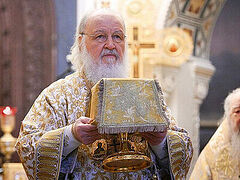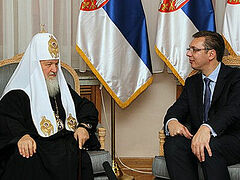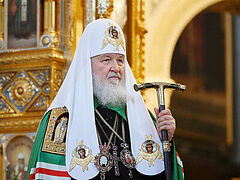Sofia, April 22, 2021
Updated April 23, 2021
A Bulgarian court has ruled that His Holiness Patriarch Kirill of Moscow and All Russia visited Bulgaria in March 2018 more as a politician than a cleric. Therefore, it found no slander or offense against religious sensibilities in the words of then-Bulgarian Deputy Prime Minister Valery Simeonov who called the Patriarch a KGB agent in response to the Russian primate’s own controversial statements.
The case was brought by Emil Milanov of the Bulgarian Ministry of Internal Affairs, the leader of the International Slavic Community-Perun-2000 public organization and Chairman of the Bulgarian political party Revival.
The Sofia District Court gave its ruling on March 17, reports the Balkan Observer.
On March 3, 2018, Bulgaria celebrated the 140th anniversary of the San Stefano Peace Treaty that provided for the establishment of an autonomous Principality of Bulgaria following nearly five centuries of Ottoman rule. The treaty was signed between the Russian and Ottoman Empires, bringing an end to the Russo-Turkish War (1877-78).
During his time in Bulgaria, Pat. Kirill concelebrated with His Holiness Patriarch Neofit of Bulgaria and met with the Holy Synod and important Bulgarian politicians. Having served with the Bulgarian primate, Pat. Kirill addressed the worshipers:
I pray now that the centuries-old spiritual connection between our peoples, which manifested itself 140 years ago, will remain inviolable for all times and will find expression in fraternal consensus and readiness to make efforts to strengthen the unity of Holy Orthodoxy, preserve Christian values and the Orthodox traditions of the fathers. I cordially greet you all with this wonderful anniversary and a wonderful holiday for the Bulgarian and Russian people. Amen.
The controversy came in Pat. Kirill’s response to Bulgarian President Rumen Radev who, during the parade on the anniversary, thanked all the peoples who fought against the Ottoman Empire. Letters of gratitude were also sent to the governments of Poland, Romania, Montenegro, Moldova, Finland, Serbia, and Ukraine.
For his part, Pat. Kirill criticized the President’s speech, stressing that Bulgaria should only thank Russia. During a bilateral meeting with the President, Pat. Kirill emphasized:
Once again, I want to tell you very clearly that Bulgaria was liberated by Russia—not by Poland, not by Lithuania, not by other countries, but by Russia. And I want to say frankly that it was difficult for me to hear all these references to the participation of other countries in the liberation of Bulgaria. Neither the Polish Sejm nor the Lithuanian Sejm decided to start a war with Ottoman Turkey. I very much hope that the media will hear us and convey some of the Patriarch’s disappointment, who heard the wrong political interpretation of the events related to the liberation of Bulgaria. We are for the historical truth, we have won it with our blood, and there can be no political and pragmatic reasons why this truth should be hushed up or misinterpreted today.
Valery Simeonov, who was Deputy Prime Minister at the time, didn’t hide his feelings about the Patriarch’s statement, bringing up a number of old accusations against Pat. Kirill on Bulgarian television.
“This man didn’t come down from Heaven, he didn’t come from Paradise, and he’s not a messenger of Jesus Christ… He has a private jet, a villa in Switzerland. His watch is worth 30,000, and he still dared to mete out judgment to the Bulgarian president,” Simeonov said, calling His Holiness “Agent Mikhailov,” a “second-rate Soviet KGB agent,” and “the cigarette Patriarch.”
“Imagine if Patriarch Neofit went to Putin and started explaining who Cyril and Methodius are,” he added.
Simeonov’s words caused their own crisis within the United Patriots parliamentary coalition, though he stood by his reaction and refused to apologize.
In court, Simeonov explained that his behavior couldn’t cause unlawful harm, since it was a comment on the behavior of a representative of a foreign state and his statements not as a spiritual and religious leader, but as the head of a foreign delegation, while a critical assessment of his motives and manifestations with political issues was made by Simeonov as a representative of the Government of the Republic of Bulgaria.
His statement was part of a public discussion on an important issue for the public, in which case the right to express an opinion took precedence over the concerns of individual citizens on this topic, he further argued.
In the end, the court rejected the charges against Simeonov.
Updated to add information about the plaintiff, Emil Milanov.
Follow us on Facebook, Twitter, Vkontakte, Telegram, WhatsApp, Parler, MeWe, and Gab!





